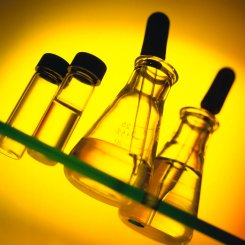 New research suggests that whey, a liquid byproduct from cheese production, may play a role in helping prevent prostate cancer.
New research suggests that whey, a liquid byproduct from cheese production, may play a role in helping prevent prostate cancer. When Ohio State University food scientists treated human prostate cells in the lab with whey protein, cellular levels of the antioxidant glutathione increased. Antioxidants such as glutathione have been shown to control cancer-causing free radicals.
Researchers suspect that the accumulation of free radicals plays a role in the development of prostate cancer.
In the current study, the Ohio State scientists found that treating prostate cells with whey protein elevated glutathione levels in the cells by up to 64 percent.
"The buildup of free radicals is associated with the onset of many chronic illnesses, such as heart disease and cancer," said Joshua Bomser, a study co-author at Ohio State. "And human prostate tissue is particularly susceptible to oxidative stress."
The study appears in the journal Toxicology in Vitro. Bomser conducted the study with Kyle Kent and W. James Harper.
The researchers treated human prostate cells with two concentrations of whey protein for 48 hours and then measured the levels of glutathione in the cells. Whey contains the amino acid cysteine - a key ingredient for making glutathione in the body. Surprisingly, both treatments increased the levels of glutathione considerably. The larger dose increased glutathione by 64 percent and the smaller dose, which was half of the larger dose, increased levels by 60 percent.
"The small difference in glutathione levels between the two whey concentrations suggests that it may not take much whey protein to get an effect in the prostate cells," Bomser said.
"In diseases like cancer, there's usually a reduction in the body's overall capacity to deal with oxidative stress," he continued. "Keeping antioxidant levels elevated through diet and supplementation may prevent the development of chronic disease."
The researchers treated another batch of prostate cells with casein, the major protein found in cheese. Casein doesn't contain the key ingredient for manufacturing glutathione, and, as expected, glutathione levels in these cells did not increase.
"Unlike casein, whey proteins are rich in cysteine, an amino acid that increases glutathione in the prostate," Kent said.
"Cheese contains various proteins that can influence the levels of different antioxidants in prostate cells," Kent continued. "But cysteine is the amino acid that helps create healthy glutathione levels in the prostate, and glutathione helps keep free radicals under control."
The researchers warn that simply eating cheese won't ensure an increase in glutathione levels, because cysteine is contained in the whey that's separated from cheese early in the cheese-making process. But cysteine is also found in foods such as poultry, wheat, broccoli and eggs.
While whey protein supplements have become popular among body builders, Bomser and his colleagues say that most people living in the United States already get plenty of protein in their diet, so adding an additional protein shake isn't necessary. They stress the importance of a well balanced diet, adding that whey is a complete protein, one that has the right amount of amino acids that are essential to our bodies.

